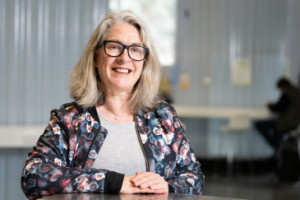Published May 25, 2023
Jane Evans leads Wellington UniVentures’ Environment & Engineering group, a team of commercialisation professionals who shape deep tech research from Te Herenga Waka – Victoria University of Wellington into new ventures that address climate change, carbon zero and future energy security challenges.
Calling for commercialisation

Jane Evans
After graduating from Melbourne’s Swinburne University of Technology with a degree in industrial chemistry, Jane didn’t embark on a career in commercialisation – she had to create one from scratch.
“It’s hard to imagine now, but decades ago when I started my first job as an industrial chemist, there was no such thing as technology transfer professionals or private venture capital firms supporting the commercialisation of scientific research.”
Early on, Jane recognised there was a missing link on the path from research to market. “There needed to be someone who understood the science and the commercial side of things equally well and could help the two sides talk to each other. I knew I could be that person.”
To develop her business savvy, Jane swapped her lab coat for a business suit and took on a variety of commercially focussed roles with the likes of ICI and Roche and gained an MBA at Macquarie University. The experience led her to a series of ‘dream jobs’ starting with working in Australia’s Cooperative Research Centres, which foster close partnerships between publicly funded research groups and industry focussed on commercial outcomes.
“It was amazing what we could deliver by enabling researchers to work hand in hand with industry. Each group understood the value that the other brought to the table, and it led to more impactful research that addressed a clear market need.”
Outsized impact
Jane joined Wellington UniVentures in 2022 with a deep appreciation for the long tradition of commercially applied research at Victoria University of Wellington, pioneered by the likes of Sir Paul Callaghan and Professor Jim Johnston.
“For a small University, we have an outsized impact in key fields. Scientific instrumentation is a good example. We have a proven reputation of launching successful companies that apply science to better understand the world."
Amongst these is the revolutionary lab bench NMR spectrometer developer Magritek, Marama Labs which makes UV-Vis spectrophotometers and, most recently, Advemto – the ultrafast grating photoluminescence spectrometer.
“We also perform exceptionally well in technologies that help progress towards global carbon zero and future energy security goals.”
New Zealand's rising stars in the clean technology sector, like the sustainable battery developer TasmanIon, green energy storage inventor Allegro Energy, and clean ammonia producer Liquium, got their start in Victoria University of Wellington’s labs and were supported to market by Wellington UniVentures.
There is good reason to expect more success stories soon. Jane’s team is currently driving the commercial development of dozens of exciting projects in the clean tech space, including:
- Sustainable energy systems through microgrids
- 'Green’ steel from hydrogen
- Magnets that detect power faults across electricity networks
Dr Geraghty and Associate Professor Natali of Liquium
Invention to innovation
“The problem we are always trying to solve is: how do you take an invention and turn it into an innovation?”
While Universities generate plenty of research outputs, only a small handful of inventions have what it takes to be innovations, explains Jane.
“Innovation is invention in practise. It takes many steps to get an invention out of the lab and into the marketplace where it can make a difference to people’s lives – the process can be daunting for researchers who don’t have experience in entrepreneurship.
Jane’s team is there to guide researchers through the commercialisation process. Beginning with protecting the IP behind the invention, navigating the complex maze of regulations and agreements, fostering collaborations with investors and industry to shape the idea into a market ready solution, and, finally, guiding fledgling companies through a spinout or licensing process.
It’s not just researchers who benefit from the work technology transfer offices do, Jane says. “Our close relationship with researchers means we are the source of the some of the most exciting new ideas in the country. That’s attractive to investors who are looking to back the technologies of the future.”
Global challenges, global opportunities
The research that Jane’s group commercialises aims to tackle the world’s most pressing challenges, from sustainable energy production and climate change to responsibly leveraging artificial intelligence. Because the problems are global, the solutions need to hold their own on the world stage.
It helps having world-class research institutes, like Robinson Research Institute and The MacDiarmid Institute, on the doorstep.
Professor Rodney Badcock from the Robinson Research Institute is a case in point. He’s building one of the world’s first fully electric superconducting motors for aeroplanes. Jane’s team is helping to open doors for Rod’s technology to take off.
Dr Lumsden and Prof Badcock from Robinson Research Institute
“Rod’s motors won’t just power electric flights within New Zealand, but around the world. To serve the global market, we need to understand what it wants and needs, and what niche we can fill. That requires working with industry leaders like Boeing, collaborating with the very best researchers in the world, and tapping into rich veins of funding.
“Our strength as commercialisation professionals is identifying and building the strategic relationships that allow technology to reach its maximum impact.”
Looking back at her career, Jane’s driving force has always been applying research to solve real life problems.
“My career started at the lab bench solving chemistry problems for industry. My role now is not so different in that I’m still applying research to solve real world problems, only now the problems are on a global scale – but, then again, I have a world-class team around me.”
